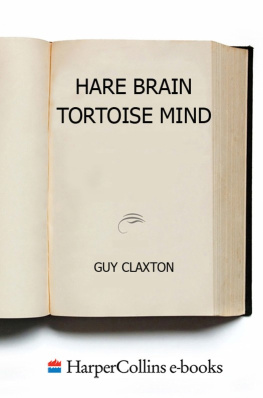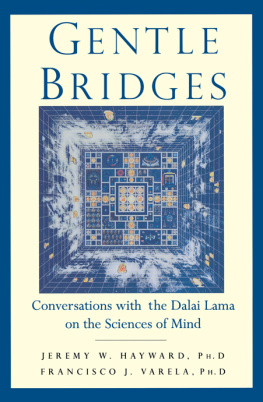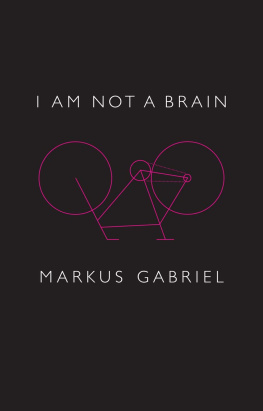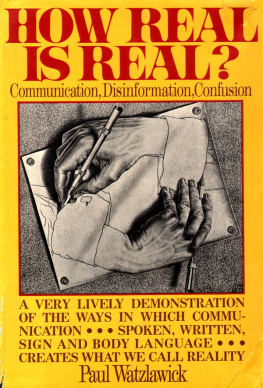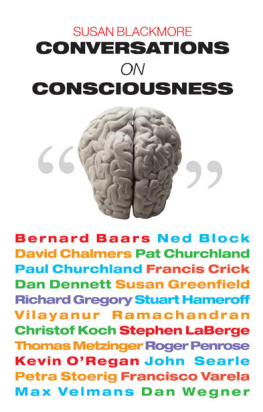Title page
The Certainty of Uncertainty
Dialogues Introducing Constructivism
Bernhard Poerksen
Translated by Alison Rosemary Koeck
and Wolfram Karl Koeck
Copyright page
Copyright Bernhard Poerksen, 2004
The moral rights of the author has been asserted
No part of any contribution may be reproduced in any form without permission, except for the quotation of brief passages in criticism and discussion.
The German original was first published under the title: Bernhard Prksen, Die Gewissheit der Ungewissheit. Gesprche zum Konstruktivismus , Heidelberg: Carl-Auer-Systeme 2001
English translation by Alison Rosemary Koeck and Wolfram Karl Koeck
Originally published in the UK by Imprint Academic
PO Box 200, Exeter EX5 5YX, UK
Originally published in the USA by Imprint Academic
Philosophy Documentation Center
PO Box 7147, Charlottesville, VA 22906-7147, USA
2013 digital version by Andrews UK Limited
www.andrewsuk.com
www.imprint-academic.com
Dedication
For Heinz von Foerster
Acknowledgements
My thanks are due first to all those who were willing to grant me hours of their time, often for several days, in the most diverse places of the world, for the conversations that are reproduced in this book. They generously gave their time to a person who was usually unknown to them and who could present no particular academic decorations to sanction his undertaking; and they carefully authorised the resulting interviews . (Possible misinterpretations, which may have sneaked in through section titles and brief characterisations in the biographical sketches, are to be charged entirely to my account.) I have to thank Julia Raabe for the competent comments she offered on the first transcriptions of the conversations: her fearless application of red ink improved the manuscript considerably . I dedicate the book to the dialogist, teacher, and friend, Heinz von Foerster. Without his encouragement and support, this book would never have materialised.
Preface: The circular view of the world
W hen the latest research report of the Biological Computer Laboratory was published on 1 November 1970, nobody could possibly have foreseen the repercussions of the ideas it contained. The essay of about 70 pages, entitled Biology of Cognition, represented a new departure in the history of philosophy and a central document for the school of thought that is known as constructivism today. Its author, the Chilean biologist Humberto R. Maturana, who was working in the USA at the time, in vigorous language pleads for the study of the processes of cognition from a biological perspective. Epistemology, the theory of knowledge - once a central domain of philosophy - is turned into a scientific discipline. It investigates thinking and perceiving by means of experiments and empirical procedures, and it completes this change of role both in self-presentation and methodology : the reflecting philosopher as the experimenter in the laboratory. Humberto R. Maturana unequivocally points out that all those seeking to probe the truth of what we perceive with the eyes of a biologist, will inevitably have to accept that they are themselves among the objects they want to describe. They are living systems that want to understand living systems . Human subjects study objects that are identical with themselves. The situation turns circular as perceivers struggle to understand the processes of perceiving. We are reminded of the mythological figure of the Ouroboros: the snake eating its own tail; a brain explaining the brain; human knowers striving to understand understanding. Human subjects turn into their own objects.
Humberto R. Maturanas essay, after only a few pages, comes up with a conclusion and a central statement that illuminates the basic tenets of constructivism, and thus the topic of this book, which is meant to be an introduction to this mode of thought in the form of interviews. His statement, at first glance, appears to be a triviality; on closer inspection, however , it discloses a different view of the world. It simply says: Anything said is said by an observer. (Maturana 1979, p. 8) It is of crucial importance that the existence of an external reality is not denied here; that this is not a statement of solipsism declaring everything a chimera and figment of the individual mind. Nor can the author be suspected of being a naive realist. He does not believe in the observer-independent existence of objects that are - in an ontologically congruent way - mirrored in the human knowers mind. Maturanas views, and the constructivists views in general, represent a middle course between the varieties of realism and the exaggerations of solipsism. Neither Maturana nor the other founding figures of the constructivist school of thought, which deals with the origin and creation of conceptions of reality, deny the existence of an external world; they all deny, however, that it is possible to know that external world in a subject-independent way. Every act of cognition, it is claimed, necessarily rests on the constructions of observers - and not on the point-to-point correspondence of perception and external reality. Anything said is said by an observer.
Referring all knowledge back to knowing subjects manoeuvres these knowing subjects into the centre and makes them the focal topic. The ontological perspective, which entices us to search for invariable ontic facts, changes into a fundamental epistemological quest. We may and must now query how and what observers observe - and perhaps we can hope to find the answers in experiments on colour perception and gestalt comprehension. We may possibly expect to discover them in processes of stimulus encoding, and we may then attempt to show that the human brain, which has no direct contact with its environment, derives its internal perceptual riches that we experience as a colourful external world, from quantities of indistinguishable grey noise supplied by external stimuli. In other contexts, however, it is claimed that reality cannot be explained by recourse to the biological constitution of humans; its development and creation must be essentially linked to social processes. It is, we hear, socially constructed and results from the dependence of human beings on groups and histories, on places and traditions. In this way, we could roam through disciplines and faculties - and everywhere encounter the millennium question of the observer. We come upon it in quantum physics and in systems theory, in the work of social psychologists and sociologists of knowledge, and we discover it in philosophy and cognitive science.
The discovery of the observer
However, the ominous figure of the observer, which seems to have become a stock in trade of any epistemological debate today, has not always been that prominent. It had to be uncovered and highlighted again by a number of cyberneticians, biologists, psychologists, and communication scientists - the originators of constructivism. They have provided key concepts for the international community of scientists, still relevant today, and they have managed to create an interdisciplinary forum for the critical discussion of crucial epistemological questions that has increasingly involved the general public. Their theses, concepts, and the possibilities of their application in management, education, and psychotherapy , are meanwhile debated even in the daily press. They are - following the order of the contributions to this volume - the physicist and cybernetician Heinz von Foerster, the psychologist Ernst von Glasersfeld, the biologists Humberto R. Maturana and Francisco J. Varela, the brain scientist Gerhard Roth, the communication scientist Siegfried J. Schmidt, the psychologists and family therapists Helm Stierlin and Paul Watzlawick. With their theories and models, stories and experiments, they have supplied new and epoch-specific arguments to substantiate the early epistemological doubts of the sceptics. They are united in their criticism of dogmatic positions of all forms and shapes, and they are precursors of an intellectual culture, which has removed the rigid barrier between the natural and the cultural sciences.
Next page

